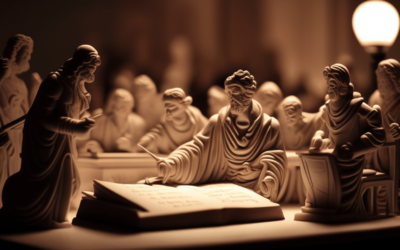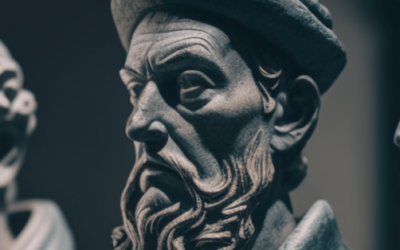Justin Martyr on the Sole Government of God:
CHAP. I.–OBJECT OF THE AUTHOR.
ALTHOUGH human nature at first received a union of intelligence and safety to discern the truth, and the worship due to the one Lord of all, yet envy, insinuating the excellence of human greatness, turned men away to the making of idols; and this superstitious custom, after continuing for a long period, is handed down to the majority as if it were natural and true. It is the part of a lover of man, or rather of a lover of God, to remind men who have neglected it of that which they ought to know. For the truth is of itself sufficient to show forth, by means of those things which are contained under the pole of heaven, the order [instituted by] Him who has created them. But forgetfulness having taken possession of the minds of men, through the long-suffering of God, has acted recklessly in transferring to mortals the name which is applicable to the only true God; and from the few the infection of sin spread to the many, who were blinded by popular usage to the knowledge of that which was lasting and unchangeable. For the men of former generations, who instituted private and public rites in honour of such as were more powerful, caused forgetfulness of the Catholic(2) faith to take possession of their posterity; but I, as I have just stated, along with a God-loving mind, shall employ the speech of one who loves man, and set it before those who have intelligence, which all ought to have who are privileged to observe the administration of the universe so that they should worship unchangeably Him who knows all things. This I shall do, not by mere display of words, but by altogether using demonstration drawn from the old poetry in Greek literature,(3) and from writings very common amongst all. For from these the famous men who have handed down idol-worship as law to the multitudes, shall be taught and convicted by their own poets and literature of great ignorance.
CHAP. II.–TESTIMONIES TO THE UNITY OF GOD.
First, then, Aeschylus,(4) in expounding the arrangement of his work,(5) expressed himself also as follows respecting the only God:–
“Afar from mortals place the holy God,
Nor ever think that He, like to thyself,
In fleshly robes is clad; for all unknown
Is the great God to such a worm as thou.
Divers similitudes He bears; at times
He seems as a consuming fire that burns
Unsated; now like water, then again
In sable folds of darkness shrouds Himself.
Nay, even the very beasts of earth reflect
His sacred image; whilst the wind, clouds, rain,
The roll of thunder and the lightning flash,
Reveal to men their great and sovereign Lord.nature
idols
Before Him sea and rocks, with every fount,
And all the water floods, in reverence bend;
And as they gaze upon His awful face,
Mountains and earth, with the profoundest depths
Of ocean, and the highest peaks of hills,
Tremble: for He is Lord Omnipotent;
And this the glory is of God Most High.”
But he was not the only man initiated in the knowledge of God; for Sophocles also thus describes the nature of the only Creator of all things, the One God:–
“There is one God, in truth there is but one,
Who made the heavens and the broad earth beneath,
The glancing waves of ocean, and the winds;
But many of us mortals err in heart,
And set up, for a solace in our woes,
Images of the gods in stone and brass,
Or figures carved in gold or ivory;
And, furnishing for these, our handiworks,
Both sacrifice and rite magnificent,
We think that thus we do a pious work.”
And Philemon also, who published many explanations of ancient customs, shares in the knowledge of the truth; and thus he writes:–
“Tell me what thoughts of God we should conceive?
One, all things seeing, yet Himself unseen.”
Even Orpheus, too, who introduces three hundred and sixty gods, will bear testimony in my favour from the tract called Diathecoe, in which he appears to repent of his error by writing the following:–
“I’ll speak to those who lawfully may hear;
All others, ye profane, now close the doors!
And, O Musaeus, hearken thou to me,
Who offspring art of the light-bringing moon.
The words I tell thee now are true indeed,
And if thou former thoughts of mine hast seen,
Let them not rob thee of the blessed life;
But rather turn the depths of thine own heart
Unto that place where light and knowledge dwell.
Take thou the word divine to guide thy steps;
And walking well in the straight certain path,
Look to the one and universal King,
One, self-begotten, and the only One
Of whom all things, and we ourselves, are sprung.
All things are open to His piercing gaze,
While He Himself is still invisible;
Present in all His works, though still unseen,
He gives to mortals evil out of good,
Sending both chilling wars and tearful griefs;
And other than the Great King there is none.
The clouds for ever settle round His throne;
And mortal eyeballs in mere mortal eyes
Are weak to see Jove, reigning over all.
He sits established in the brazen heavens
Upon His throne; and underneath His feet
He treads the earth, and stretches His right hand
To all the ends of ocean, and around
Tremble the mountain ranges, and the streams,
The depths, too, of the blue and hoary sea.”
He speaks indeed as if he had been an eyewitness of God’s greatness. And Pythagoras(1) agrees with him when he writes:–
“Should one in boldness say, Lo, I am God!
Besides the One–Eternal–Infinite,
Then let him from the throne he has usurped
Put forth his power and form another globe,
Such as we dwell in, saying, This is mine.
Nor only so, but in this new domain
Forever let him dwell. If this he can,
Then verily he is a god proclaimed.”
CHAP. III.–TESTIMONIES TO A FUTURE JUDGMENT
Then further concerning Him, that He alone is powerful, both to institute judgment on the deeds performed in life, and on the ignorance of the Deity [displayed by men], I can adduce witnesses from your own ranks; and first Sophocles,(2) who speaks as follows:–
“That time of times shall come, shall surely come,
When from the golden ether down shall fall
Fire’s teeming treasure, and in burning flames
All things of earth and heaven shall be consumed;
And then, when all creation is dissolved,d
The sea’s last wave shall die upon the shore,
The bald earth stript of trees, the burning air
No winged thing upon its breast shall bear.
There are two roads to Hades, well we know;(3)
[TRANSLATED BY THE REV. G. REITH, M.A.]






